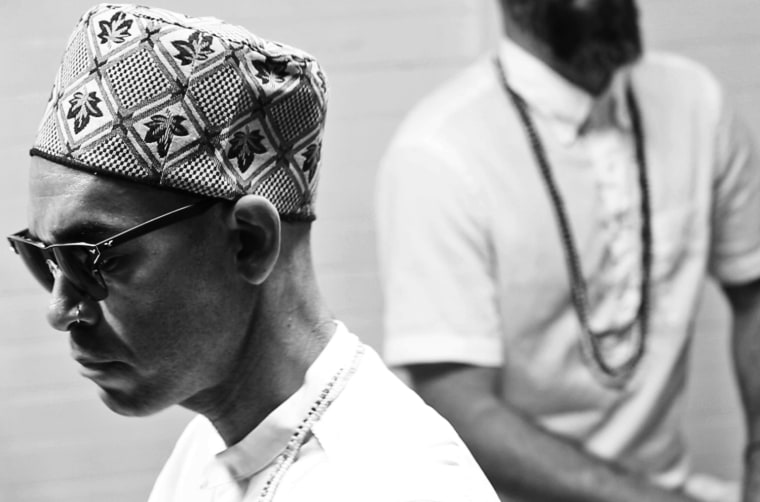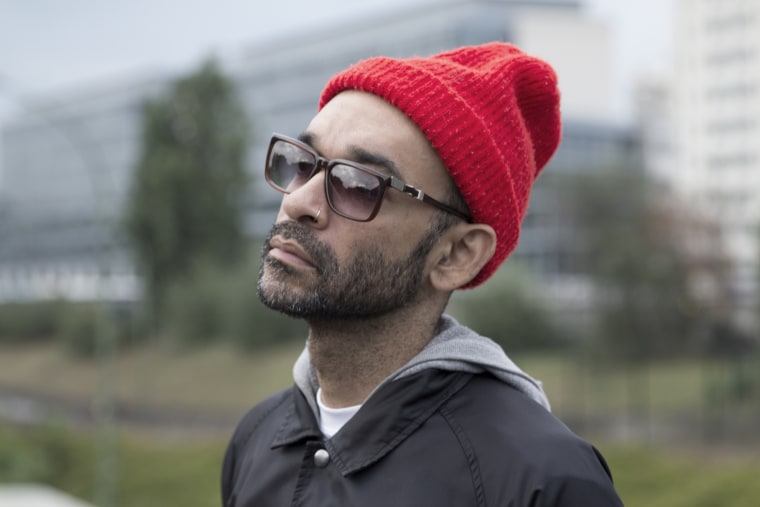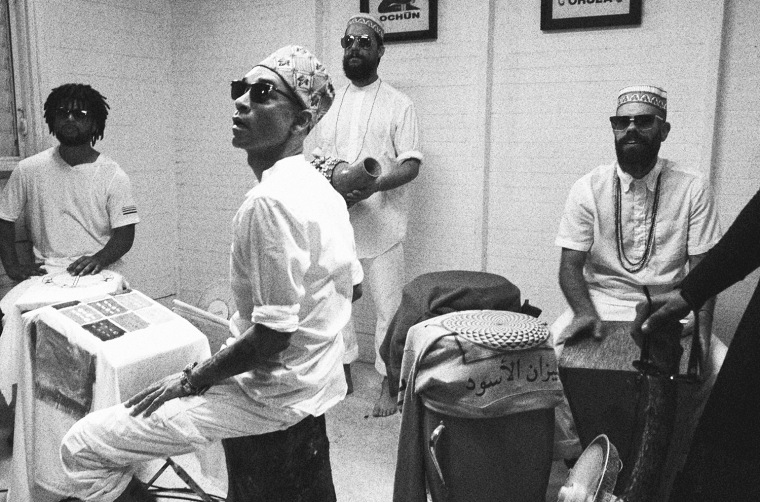In the Yoruba faith, there is a thing called destiny.
The story of how Mark Underwood, an African American from Indiana, gets to Puerto Rico and becomes Otura Mun, a Babaláwo priest in the Yoruba faith is a very unlikely story. Even more so, he’s created a musical niche with his band ÌFÉ that quickly launched international touring dates after the release of just two songs.
There is no separation between the man, the music and his spiritual mission. ÌFÉ’s recently released new album, ÌFÉ, IIII + IIII has a hypnotically atmospheric sound that mesmerizes from the first note with emotive vocals powered by synthesized polyrythmic rumba influences and a strong Yoruba spirit.
Otura Mun's journey began with an airline mix-up of flights between Texas and Indiana and a chance trip to Puerto Rico on a voucher that opened up his world. But to Mun, nothing is chance. Leaving behind the pain of his brother’s death, Puerto Rico became his home. There was music everywhere. And strong, ancestral African traditions he wasn’t exposed to in the Midwest.
Seeing a very different Black experience in Puerto Rico was a shock. There was no “racial caste system” where people define and defend their identities based on race, as he notes in the US mainland.

“I do not like the box,” he says. “The idea of drawing borders around each other and having to defend those borders based on race. And I don’t like the idea that once I do that, I’ve committed to a game that I didn’t define the rules of and where I will always be a second-class citizen.”
RELATED: J Balvin Earns Guinness World Record for His Song ‘Ginza’
Otura Mun immersed himself in learning Yoruba traditions and practicing congas and rumba drumming for 12 hours a day, seven days a week. He worked as “DJ Nature,” sampling old music. “I would start with some bit of some song, sample it and chop it up in a very hip-hop way,” he says. As he transformed, so did his sound.
Recently, Otura Mun took a break from his tour in Europe to talk to NBC Latino about his full album release, the magic behind his niche music and becoming a Babaláwo priest.
Describe your sound and the influences behind it.
If Jamaica and Cuba had a child today, this is probably how it would sound. The drum and spiritual underpinnings come out of Cuba. The dance hall, the electronic sounds, club feel, and the idea of paying homage and demanding newness comes from Jamaica.
There is a deep spiritual component to your music reflecting the Yoruba religious practice that arrived in the Caribbean from West African slaves. It also seems to be a cornerstone of your sound and your life right now. Can you offer us a very basic Introduction to help us understand the music?
We get most of our knowledge of it from Cuba. There are two houses in the Afro-Cuban style of Yoruba: Ochá and Ifá. The priests on the Ochá side are Santeros/Santeras. Ifá priests are Babaláwos (slurred as Babalau).
I was initiated as a Babaláwo priest two years ago. I’m just a baby in the religion. Many of the elements in the music of ÌFÉ come through my lens of Ifá. [The music] is me working through the changes I’m seeing in my world as I’m growing inside the religion. That’s where my name, Otura Mun comes from. As a Babaláwo, I’ve dedicated my life to Ifá and the practice of helping others. Everything that I do is soaked in that practice.

Talk to me about the language of the drums, and the role of the African inspired call-and-response vocals in ÌFÉ’s music.
Most of what we do is built on the rumba clave [a sort of musical pulse that guides the music.] Rumba itself is a percussive music; there are no melodic instruments, just drums and voice. So, I took a couple drum machines that you can sample sounds of rumba with, and I made those the brain of my electronic sound.
To do that, I then drilled holes in the congas and added electronic sensors, and then connected those to that brain. And now the drums that we’re playing in our version of the rumba are the electronic sounds we make; you don’t actually hear the skins of the drum.
RELATED: Grammy Winner Ile Cabra Has Made Her ‘Old Soul’ a Feminine Force
This is where the spiritual intersects with the musical?
We have the opportunity to communicate with the Orishas in a very literal sense. And the musicians that are in charge of bringing these divinities to the ground in order to commune with the religious community are drummers. Each divinity has its own songs and dances. The songs are played on batá drums. So the conversations in between the three drums are mimicking the songs that are incantations of those dieties.
ÌFÉ means “love” and “expansion.” That must be what makes your music so powerful, that divinity aspect.
Prayer for Odudua (Para Merceditas) is an electronic version of a traditional Orisha Prayer song for the Orisha Odudua and Obatala. And the conversation that you hear in the drums are the actual drum patterns for Odudua in a ritual sense. What we did was change the sounds of the drums.
The undercurrents that are there are just levels that some people are gonna get and some people aren’t and that’s OK because I wrote for many different groups at the same time. The heart that’s behind the music is there with you, and you may not sense it in the same way that everyone senses it but the power of it is there and it’s gonna be with you from the moment you press play, ‘til the last song.
What has been the response to your music? I think it’s going to explode.
Worldwide it’s been pretty amazing. Off of two songs we’ve been able to tour Europe and North America. We’re back in Europe now for a month. That’s been my dream to travel and play music and I’m doing that on my terms. It’s incredible. All I wanted was to be able to communicate and hopefully send some inspiration someone’s way. So, it has been great. I’m blown away.
I can’t wait to finally hear people’s reactions to the whole record, because most people have only heard the first two or three singles. So I’m really happy to have a body of work — and people don’t question what it is I’m trying to do anymore, ha ha! The record itself is what I wanted it to be...It hits the hardest if you listen from number one all the way down to number nine. I’m trying to put you somewhere. So, hopefully you’re gonna get something positive out of that experience.

